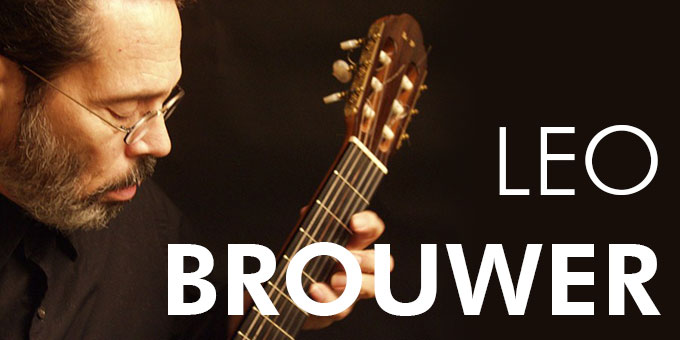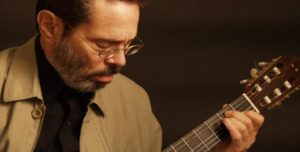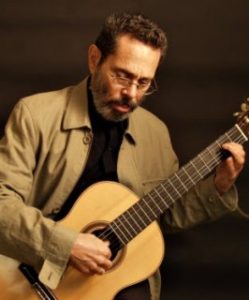 LEO BROUWER, ORGULLOSO HEREDERO MUSICAL DE ERNESTO LECUONA.
LEO BROUWER, ORGULLOSO HEREDERO MUSICAL DE ERNESTO LECUONA.
El fabuloso guitarrista, uno de los compositores más emblemáticos a nivel mundial y director de orquesta de fama mundial, Leo Brouwer, cumplió ya 80 años. Nació en La Habana el 1ro. de marzo de 1939 y su huella ya resulta en nuestra historia indeleble, porque ha marcado un hito en la guitarra y no sólo como gran intérprete, sino además como compositor de primer orden para su instrumento.
No hay otro músico del mayor archipiélago de las Antillas que haya conseguido aportar obras tales como Decamerón Negro, Elogio de la Danza y La Espiral Eterna, quizá solo comparable con su tío Ernesto Lecuona, un clásico cubano; mas su sobrino lo logró, desde la vanguardia.
Gracias a su obra para guitarra, el compositor ha tenido la oportunidad de ser inmensamente conocido y reconocido en todo el mundo. Muestra del impacto de esa trascendencia fue en 2010 el Premio Tomás Luis de Victoria, el más alto reconocimiento a un compositor vivo instituido por la Fundación Autor y la Sociedad General de Autores y Editores, de España.
Además, sus estudios son obligatorios en la formación curricular de los guitarristas y no hay ejecutante de ese instrumento que prescinda de sus obras a la hora de conformar repertorios altamente demandantes. Pero quizá el logro mayor de Juan Leovigildo Brouwer Mesquida sea el respeto de sus contemporáneos al quedar como “Capo Scuola” (Cabeza de Escuela) de la guitarra y la música internacional.
La historia de Brouwer comenzó como la de todo niño en su casa, o más específicamente en la sala de su tía-abuela Ernestina Lecuona, hermana mayor de Ernesto Lecuona, en la que se tocaba el piano todo el día por diferentes artistas como Esther Borja, aunque ese instrumento no tenía nada especial para él, hasta que descubrió la guitarra y él mismo confiesa:
“Cuando tenía 10 u 11 años, un día encuentro a mi padre tocando la guitarra, tocaba muy bien de aficionado, y ese instrumento me hechizó, no sé por qué, era el sonido, era la dulzura, pegado al cuerpo, un instrumento sensorial por excelencia y así fue.
En 1959 Brouwer ganó una beca en la escuela Juilliart de Nueva York, en los Estados Unidos, aparecida en la Gaceta Oficial, ofrecida por el Gobierno Revolucionario a varios alumnos. “Yo salí el 14 de octubre de 1959 para Nueva York, recuerdo que nos aparecimos con un baúl mundo, de esos que eran muy grandes, era algo asombroso (Leo se ríe de aquella locura). En realidad, sobre guitarra no había mucho que aprender allá, mis maestros fueron Gertrude Weinberger (austriaca) y el compositor Vicent Persiquetti”.
En esa primera etapa Leo no había recibido el dinero y pasó mucho trabajo en aquella ciudad fría, una verdadera selva de asfalto. “Ahí fui conociendo aquel mundo que nunca me gustó; al extremo que, cuando se rompen las relaciones entre los Estados Unidos y Cuba, el 4 de julio de 1960, regresé de inmediato a mi país, no lo pensé dos veces. Tuve que regresar a Cuba sin la graduación -refiere Brouwer-, pero no lo pensé dos veces, regresé porque sabía que en Cuba había lugar para el arte y la cultura”.
Aquí abrirse paso en un principio no fue tarea fácil, pero el talento se fue imponiendo poco a poco, y su arduo trabajo con el Grupo de Experimentación Sonora del Instituto Cubano del Arte e Industria Cinematográficos ICAIC fue una piedra angular para su despegue. Después llegaron los constantes conciertos por diferentes países de Europa y América Latina que le ofrecieron visibilizar su trabajo por todo el mundo.
Finalmente llegaron los honores, pues como expresó una reseña de 1980 del periódico The Times de Londres: “Las composiciones para guitarra de Leo llevan el sello de su perfecto entrenamiento en la tradición clásica. Y a su vez, todas sus obras son el resultado de un artista que se ha liberado de las perspectivas usualmente limitadas del guitarrista clásico”.
Posee en Cuba todos los galardones, medallas, órdenes, premios, Honoris Causa. La Asamblea del Consejo Internacional de la Música de la Unesco (1988), lo colocó como un clásico, en el status de Miembro de Honor de la Música de Por Vida.
Y todos esos lauros, muy merecidos, son fruto de una cosecha abundante porque Leo Brouwer sembró y sembró fértiles semillas para la cultura nacional, y por ello, hoy el país celebra jubiloso estas ocho décadas del músico cubano más grande de todos los tiempos.
 LEO BROUWER, PROUD MUSICAL HEIR OF ERNESTO LECUONA.
LEO BROUWER, PROUD MUSICAL HEIR OF ERNESTO LECUONA.
The fabulous guitarist, one of the most iconic composers in the world and world-famous conductor, Leo Brouwer, turned 80 years old. He was born in Havana on the 1st. March 1939 and its imprint is already in our indelible history because it has marked a milestone in the guitar and not only as a great performer but also as a composer of the first order for his instrument.
There is no other musician from the largest archipelago in the Antilles who has managed to contribute works such as Decamerón Negro, Elogio de la Danza, and La Espiral Eterna, perhaps only comparable with his uncle Ernesto Lecuona, a Cuban classic; but his nephew did it, from the vanguard.
Thanks to his work for guitar, the composer has had the opportunity to be immensely known and recognized throughout the world. An example of the impact of this transcendence was the Tomás Luis de Victoria Prize in 2010, the highest recognition of a living composer instituted by the Autor Foundation and the General Society of Authors and Publishers of Spain.
In addition, their studies are mandatory in the curricular training of guitarists and there is no performer of that instrument that dispenses with his works when it comes to forming highly demanding repertoires. But perhaps the greatest achievement of Juan Leovigildo Brouwer Mesquida is the respect of his contemporaries to be like “Capo Scuola” (Head of School) of the guitar and international music.
The story of Brouwer began as that of every child in his house, or more specifically in the room of his aunt-grandmother Ernestina Lecuona, older sister of Ernesto Lecuona, in which the piano was played all day by different artists such as Esther Borja , although that instrument did not have anything special for him, until he discovered the guitar and he confesses:
“When I was 10 or 11 years old, one day I found my father playing the guitar, he played very well as an amateur, and that instrument enchanted me, I do not know why, it was sound, it was sweetness, close to the body, a sensory instrument par excellence and that’s how it was.
In 1959 Brouwer won a scholarship at the Juilliart School in New York, in the United States, which appeared in the Official Gazette, offered by the Revolutionary Government to several students. “I left on October 14, 1959 for New York, I remember that we appeared with a trunk world, of those that were very large, it was something amazing (Leo laughs at that madness). Actually, on guitar there was not much to learn there, my teachers were Gertrude Weinberger (Austrian) and the composer Vicent Persiquetti “.
https://youtu.be/Bkq1dRUI-60
In that first stage Leo had not received the money and he spent a lot of work in that cold city, a real asphalt jungle. “There I went knowing that world that I never liked; to the point that, when the relations between the United States and Cuba were broken, on July 4, 1960, I immediately returned to my country, I did not think twice. I had to return to Cuba without graduation, “Brouwer remarks,” but I did not think twice, I came back because I knew that in Cuba there was room for art and culture. ”
Here, opening up at the beginning was not an easy task, but the talent was imposed little by little, and his hard work with the Sound Experimentation Group of the Cuban Institute of Art and Film Industry ICAIC was a cornerstone for its takeoff. Then came the constant concerts in different countries of Europe and Latin America that offered him to make his work visible all over the world.
Finally the honors arrived, because as a 1980 review of the London Times newspaper put it: “Leo’s guitar compositions bear the stamp of his perfect training in the classical tradition. And in turn, all his works are the result of an artist who has freed himself from the usually limited perspectives of the classical guitarist “.
He has in Cuba all the awards, medals, orders, prizes, Honoris Causa. The Assembly of the International Council of Music of Unesco (1988), placed it as a classic, in the status of Honor Member of Music for Life.
And all those laurels, well deserved, are the result of an abundant harvest because Leo Brouwer sowed and sowed fertile seeds for the national culture, and for that reason, today the country jubilantly celebrates these eight decades of the greatest Cuban musician of all time.
Agencies/ RHC/ Miguel D. García/ Extractos/ Internet Photos/ YouTube/ Arnoldo Varona/ www.TheCubanHistory.com
THE CUBAN HISTORY, HOLLYWOOD.



 LEO BROUWER, Proud Musical Heir of Ernesto Lecuona. VIDEOS.
LEO BROUWER, Proud Musical Heir of Ernesto Lecuona. VIDEOS.



